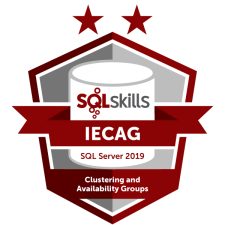Overview
This 3/400 level, SQL Server training class will teach you how to plan for, implement, and maintain AlwaysOn Failover Clustered Instances and AlwaysOn Availability Groups in SQL Server 2012 and higher using best practices and real-world experience.
The class will start by explaining Windows Server Failover Clustering, which is the basis of both AlwaysOn features in SQL Server; Failover Clustered Instances and Availability Groups. Then each feature will be examined in depth to understand the considerations, requirements, and best practices behind their implementation, so you can build a rock-solid high-availability and/or disaster-recovery strategy for your SQL Server workload.
High Availability is an area that is critical in today’s environment and all DBAs should be able to design and implement an appropriate availability strategy and coordinate a successful recovery after a disaster.
Instructor: Jonathan Kehayias
Need Help Justifying Training? Here’s a letter to your boss explaining why SQLskills training is worthwhile and a list of community blog posts about our classes.
Ready to buy? Please see our Immersion Event Offerings for options, bundles, pricing. and more.
Curriculum
Module 1: Windows Server Failover Clustering Essentials
The foundation on which SQL Server AlwaysOn Failover Clustered Instances and AlwaysOn Availability Groups are built is Windows Server Failover Clustering, and in this module we’ll build a solid foundation of understanding the requirements and best practices for failover clusters within Windows. Topic covered include:
- Planning a failover cluster configuration
- Differences in Windows Server versions
- Planning storage requirements and hyper-converged configurations
- Active Directory disconnected clusters
- Proper configuration of quorum
- Cluster validation tests
- How failover works
- Troubleshooting clustering issues
Module 2: AlwaysOn Failover Clustered Instances
Deploying a Failover Clustered Instance (FCI) for SQL Server has long been a mainstay of SQL Server high availability strategies. Whether you’ve never implemented an FCI of SQL Server, or you’ve been doing it for years, this module will cover what’s changed in SQL Server for FCIs and how to implement them as a part of an availability strategy for SQL Server. Topics covered include:
- Storage planning for SQL Server
- Choosing the proper service account
- Installation of a Failover Clustered Instance
- Configuration options to consider
- Multiple instance considerations
- Patching and rolling updates
- Clustered instance upgrades
Module 3: AlwaysOn Availability Groups
Availability Groups are one of the hot topics for SQL Server thanks to a very successful marketing approach by Microsoft, starting with their introduction in SQL Server 2012. Availability Groups replace and enhance the capabilities of database mirroring, and have added new functionality with each release of SQL Server. Topics covered include:
- Availability Group overview
- Basic Availability Groups in Standard Edition
- Advanced Availability Groups in Enterprise Edition
- Distributed Availability Groups
- Readable secondaries
- Application connection support
- Migrating from database mirroring
- Asymmetric storage considerations
- Security
- Performance
Module 4: Implementation Case Studies
One of the best was to learn how to implement (and how not to implement!) SQL Server high availability solutions is to look at example implementations and understand the factors and decisions that lead to how things were configured. This module will use real-world case studies to highlight both successful implementations along with failed implementations (where SQLskills was brought in to mitigate the problems in the original implementation). Topics covered include:
- Mixing FCIs with AGs for HA and DR
- Forcing service in a real disaster
- Why Windows Server version matters
- Workload issues with readable secondaries
Ready to buy? Please see our Immersion Event Offerings for options, bundles, pricing. and more.
Questions?
If you have any questions not answered by our Immersion Events F.A.Q., please contact us.

